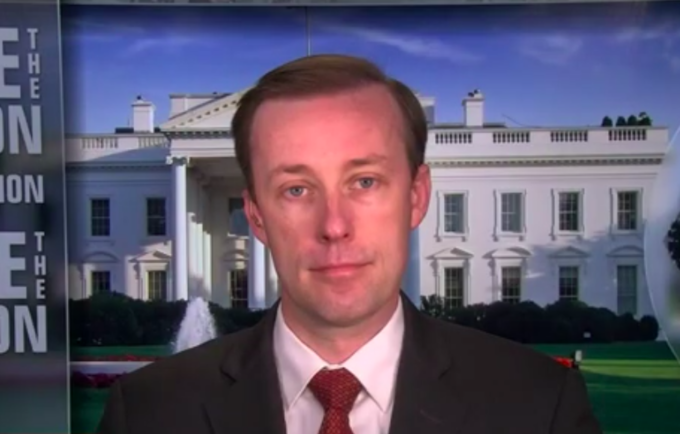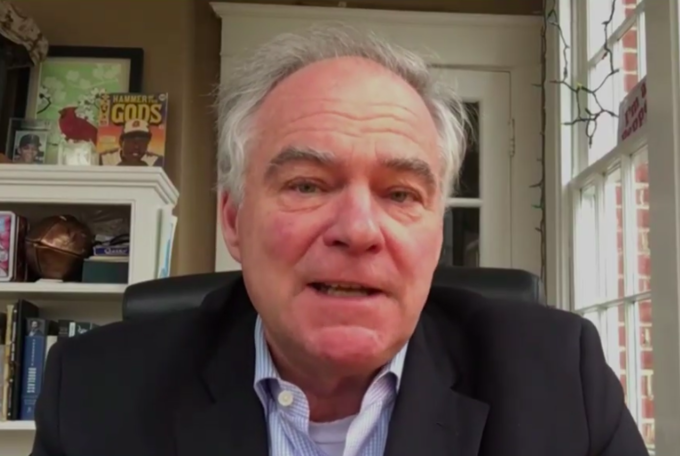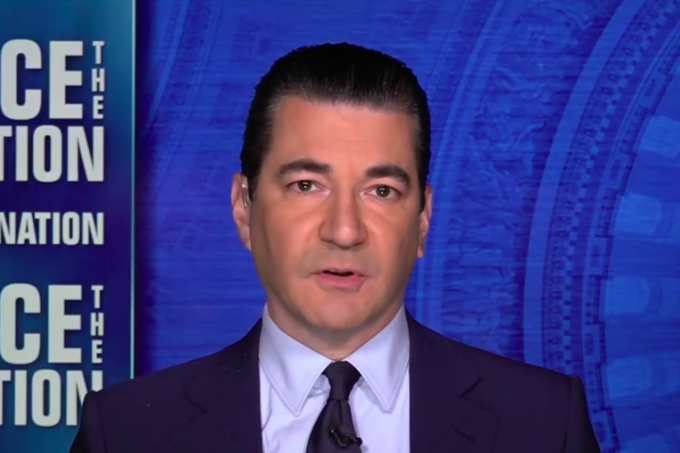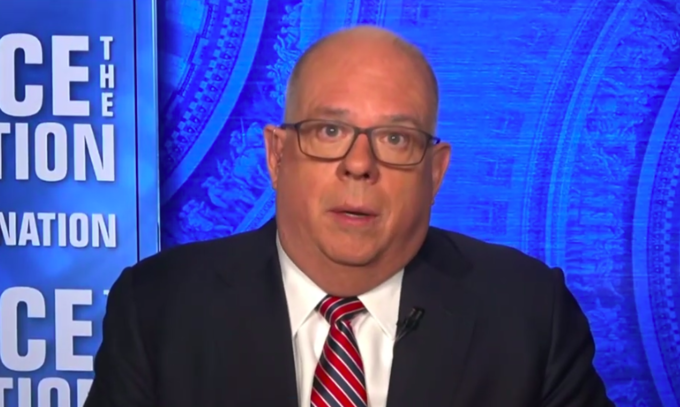| "If it turns out that Russia is pummeling Ukraine with cyberattacks, and if that continues over the period ahead, we will work with our allies on the appropriate response." - White House national security adviser Jake Sullivan on Russia's possible cyberattacks on Ukraine
Welcome to the "Face the Nation" Five at Five newsletter. Scroll down for your five takeaways from today's broadcast of "Face the Nation with Margaret Brennan" on CBS. Did someone forward you this? Sign-up at cbsnews.com/email. 1. Jake Sullivan: "Severe economic consequences" if Russia invades Ukraine  White House national security adviser Jake Sullivan joins Margaret Brennan on "Face the Nation" to discuss the suspected cyberattack Ukraine suffered at hands Russia What we asked: "Well, the Ukrainians are saying it looks like it has some Russian fingerprints on it. Why wouldn't this draw US sanctions? Why are you waiting for Vladimir Putin to go further and actually cross the border? Aren't we already in the middle of a conflict?" What Sullivan said: "Well, first, Margaret, as I said before, we need to work through attribution, and again, as I said, this is part of the Russian playbook, so it would not surprise me one bit if it ends up being attributed to Russia. But let's do first things first, let's get attribution and then make a determination about what we do next. In terms of sanctions, what we have laid out is a very clear message to the Russians, and we've done so in concert and in unison with our allies that if they do further invade Ukraine, there will be severe economic consequences and a price to pay. And yes, of course, if it turns out that Russia is pummeling Ukraine with cyberattacks, and if that continues over the period ahead, we will work with our allies on the appropriate response." Why it matters: The threat of a Russian invasion into Ukraine has continued to intensify, and U.S. officials believe Russian President Vladimir Putin could order military action as soon as this month or February. 2. CBS News poll: President Biden lacks focus on inflation 
In our latest CBS News poll, we asked Americans how they felt the issues affecting them the most, one year into the Biden presidency. Overall, Americans feel worse about the pandemic and economy than they did earlier in his term, and his ratings have suffered for it. But it's a little more nuanced: they do not exclusively blame his policies, but they do demand more attention to inflation just the same; there are many reasons the pandemic is seen as bad, but confusing information stands out as a factor that is hurting views of his handling of it.
"Focus" is a running theme in this story. Majorities say he isn't paying enough attention to either the economy or inflation -- together, their top issues -- not just that he isn't handling them well. Few think Mr. Biden and his fellow Democrats are focused on the right things overall, either. You can read (or watch) CBS News Elections & Surveys Director Anthony Salvanto's full breakdown of the latest poll here. 3. Kaine: Build Back Better can "deal" with inflation concerns  While responding to President Biden's latest poll numbers, Senator Tim Kaine of Virginia admitted that inflation is an issue and the Build Back Better bill can help solve it. What we asked: "Even the White House economist is using the past tense when referring to Build Back Better. It's dead. You don't have the votes in the Senate. " What Kaine said: "Yeah, I don't agree with you, Margaret, you're right that it's dead, the- the most recent version of it is not going to happen, but if you look at the core of the bill, I think the core is education and workforce and things like reduced child care and education expenses, workforce training and then support for the workforce in areas like health care. There are other pieces of the bill that are more controversial. I still believe we're going to find a core of this bill, whatever we call it, we're going to find the core of the bill and pass it, and it will deal directly with some of these inflation concerns." Why it matters: When asking our CBS News poll responders, who disapprove of President Biden, what could help improve their opinion, 63% said that would be getting a handle on inflation, while 24% said their opinions would approve with the passage of Build Back Better. 4. Gottlieb: "Most people are going to get COVID in their lifetime"  Dr. Scott Gottlieb, the former head of the Food and Drug Administration, echoes the same acknowledgement that his successor told Congress this week: That most people will be infected with the coronavirus. What we asked: "The acting FDA commissioner told Congress most people are going to get COVID, Dr. Fauci said most people will be exposed to it at some point. I mean, these statements make people at home go, what am I doing here? Why am I trying to protect myself? At this point, what can you do?" What Gottlieb said: "Well, look, I think the reality is most people are going to get COVID in their lifetime, I don't think most people need to get COVID within the next month and anything we can do to try to protect ourselves to extent that there are people who haven't been exposed to this virus yet, who've gone out and gotten vaccinated, been able to protect themselves. You know, if they can keep themselves protected for the next several weeks, we will probably be through this Omicron wave. And then we'll have to deal with this probably next fall when we have better tools available to us. I would much rather have my reckoning with COVID after I've been vaccinated a number of times after there are orally available drugs widely accessible to treat this infection. After there's monoclonal antibodies, widely accessible to treat it. After diagnostic testing is stockpiled in my house and those- those realities will be truth come this fall, certainly come this summer, so I think people will be in a much better position to grapple with this next fall. I think we should remain vigilant for the next several weeks, try to avoid this infection if you can." Why it matters: Changing COVID guidance, calls for a fourth shot, and an Omicron wave that has yet to hit the midwest are troubling signs for Americans as winter presses on. 5. Hogan: Biden admininstration "falling short" on COVID response  While discussing his state's response to the COVID pandemic, Maryland Governor Larry Hogan says "we're trying to get as much help as we can from the federal government," but there appears to be issues. What we asked: "Eighty percent of hospital beds are occupied in your state, Omicron is really hitting hard. There are comparisons right now to where we were in 2020. Have you seen a real change in the ability of the federal government to respond to states like yours?" What Hogan said: "Well, so we have been impacted really hard over the past couple of weeks, and we reached a higher point than we ever did during the rest of the nearly two years of this crisis. We've got a little bit of positive news and- in that it's not quite a trend, but over the past four or five days, we've seen fairly dramatic decreases in both hospitalizations, positivity rate and case rate. And so it's hopeful, and we're- we're going to keep an eye on that over the next 10 days to see if we continue. But we're still in a pretty tough spot, and that's why I declared a state of emergency. We- we did a lot of things to try to help increase the capacity of our hospital systems. Sent in a thousand members of the National Guard. And you know, we're taking a lot of actions directly and we're- we're trying to get as much help as we can from the federal government. But, you know, quite frankly, they're fallen short in a couple of ways." Why it matters: Maryland, like many other states, are facing a severe strain on their hospital system due to the Omicron wave, and critics have pointed to the Biden administration's lack of preparation for new COVID waves and variants. |
No comments:
Post a Comment